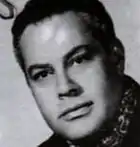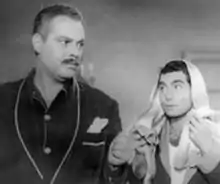Yehia Chahine
Yehia Chahine (Arabic: يحيى شاهين, Yeḥyā Shāheen) (28 July 1917 – 18 March 1994) was an Egyptian film producer and an actor of film and theatre. He is most notable for his role in the film adaptations of the Cairo Trilogy, a trilogy written by the Nobel Prize-winning Egyptian author Naguib Mahfouz.
Yehia Chahine | |
|---|---|
| يحيى شاهين | |
 | |
| Born | Yehia Yehia Hasan Chahine 28 July 1917 Imbabah, Egypt |
| Died | 18 March 1994 (aged 76) Egypt |
| Occupation(s) | Film actor, producer |
Life and career
Yehia Chahine was born in Imbaba, Giza. His father's name was Yehia Chahine too. He received a diploma in performing arts and started acting in theatre. His first performance was in the play Murtafa`t wa Darag (Heights and Stairs). In 1935, he acted in his first film.[1][2]
He acted in numerous films, but his most notable role is that of Al-Sayyid Ahmad Abd al-Jawad, a Cairene patriarch, in the Cairo Trilogy films. The three films, Bayn al-Qasrayn (Palace Walk, which is based on the Palace Walk novel) in 1964, Qasr al-Shawq (Palace of Desire) in 1967 and Al-Sukkariya (Sugar Street) in 1973, were set in Cairo and followed the family of Abd al-Jawwad across three generations, from World War I to the overthrow of King Farouk in 1952. They were well received and successful in Egypt and the Arab world.[2][3]

Additionally, he has acted in many other successful films. He starred in film director Youssef Chahine's Ibn al-Nile (Son of the Nile) along with Faten Hamama in 1951. He played a leading role in the 1954 film Gaalouni Mujriman (I Have Been Made a Murderer), which was based on a novel by Naguib Mahfouz. In 1957, he starred in La Anam (Sleepless), a film that was chosen as one of the best 150 Egyptian film productions. His last film role was in 1988, in the film Kul Hatha al-Hub (All this Love).[3]
Chahine received several awards for his film roles. In 1993, he received the Sciences and Arts prize. He died at the age of 76, on 18 March 1994.[1][2]
Films
Selected works
- 1947: "Azhar wa Ashwak" (أزهار وأشواك)
- 1958: "Haza Howa el hob" ( هذا هو الحب)
- 1964: "Bain al-Qasrain" (بين القصرين)
- 1966: "Thalath Losoos" (ثلاث لصوص)
- 1967: "Qasr al-Shawq" (قصر الشوق)
- 1968: "The Splendor of Love" (روعة الحب)
- 1969: "Shey Min el Khouf" (شيء من الخوف)
- 1973: "Al Sokkareyah" (السكرية)
References
- "Biography" (in Arabic). Yalla Cinema. Retrieved 7 February 2007.
- "Biography" (in Arabic). Egyptian Libraries Network. Archived from the original on 27 September 2007. Retrieved 7 February 2007.
- "Biography" (in Arabic). Mashy Cinema. Retrieved 7 February 2007.